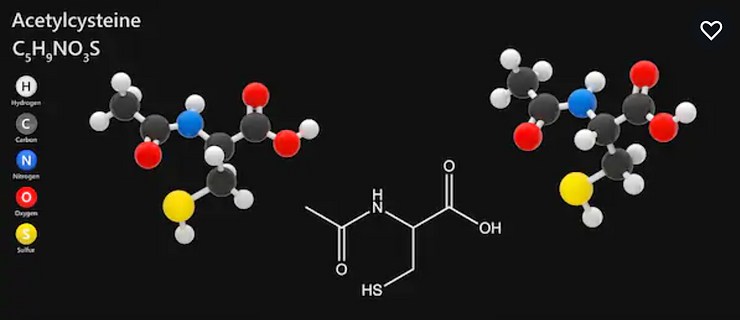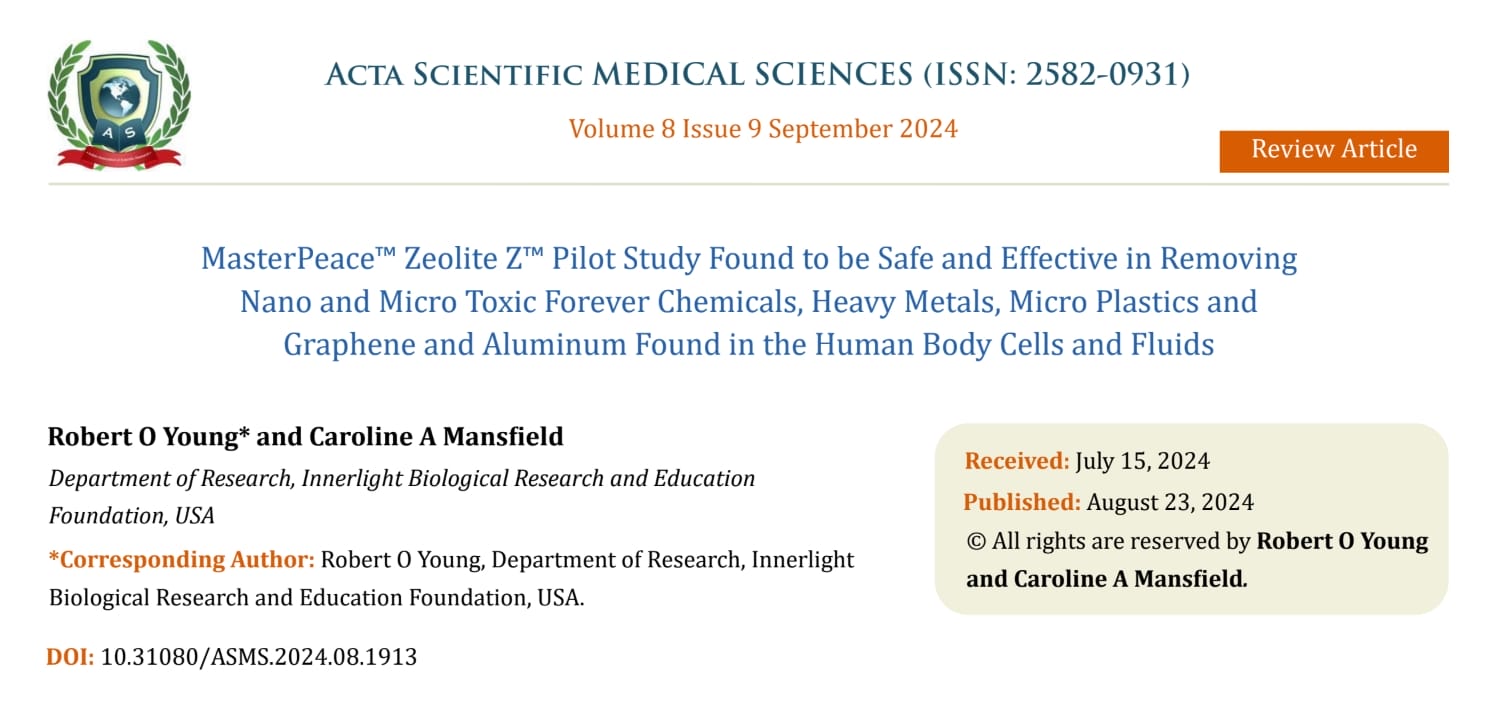The Many Health Benefits of N-Acetyl-Cysteine (NAC) & Glutathione
Updated: Jul 29, 2021

N-Acetyl Cysteine is a very important essential amino acid!
N-Acetyl Cysteine (NAC) is considered a semi-essential by current scientists because your body can produce it from other amino acids, namely methionine and serine. I have suggested that NAC is essential because most lifestyles and diets are highly acidic reducing the levels of methionine and serine which are needed to produce NAC.
The amino acid Cysteine is found in most alkaline foods, such as avocado, buckwheat, broccoli, spinach, kale, hemp seeds, pumpkin seeds, flax seeds, borage seeds, broccoli seeds, carrot seeds and legumes.
N-acetyl cysteine (NAC) is the supplement form of cysteine. Consuming adequate cysteine and NAC is important for a variety of health, fitness and mental health reasons — including replenishing the most powerful antioxidant or anti-acid in your body, glutathione. These amino acids also help with acute and chronic respiratory conditions, fertility and brain health.
Here are the many health benefits of NAC
NAC is Essential for Making the Powerful Antioxidant Glutathione
NAC is valued primarily for its role in antioxidant production or reducing metabolic, respiratory, dietary and environmental acidic waste in the interstitial fluids of the Interstitium.

Glutathione is one of the body’s most important antioxidants or anti-acids, which helps neutralize acidic toxic waste that can damage cell membranes, genetics of all body cells that make up organs, tissues and glands of an animal and human body.

NAC is essential for supporting the white blood cells in buffering acidic waste that causes cellular damage. My research indicates that it may even contribute to longevity[1].
NAC, antioxidant or acidic neutralizing properties are also important for preventing and reversing numerous other ailments caused by oxidative or acidic stress, such as heart dis-ease, infertility and some bowel, blood and brain health challenges.[2]
SUMMARY
NAC helps to replenish glutathione, your body’s most powerful antioxidant or anti-acid. Therefore, it can improve a variety of health, fitness and mental conditions.
NAC Helps With Detoxification to Prevent or Diminish Kidney and Liver Damage
NAC plays an important role in your body’s detoxification process.
NAC can help prevent the effects of drugs and environmental acidic toxins such as aluminum oxide and dioxide, titanium dioxide, hydrogen arsenic, zinc dioxide, barium poisoning, Technetium 99m, EMF poisoning from electrical and magnetic pulsating fields ranging from 400mHz to 98gHz, carbon monoxide poisoning, black carbon, alcohol poisoning, acetaminophen poisoning, gallium, cadmium, mercury, graphene oxide and/or lead poisoning, just to name a few.[3]

NAC also has applications preventing and/or reversing decompensated acidosis of the interstitial fluids of the liver due to its antioxidant and anti-inflammatory benefits.[5]
SUMMARY
NAC helps detoxify your body of metabolic and dietary acids and can neutralize the acid acetaminophen.
NAC May Improve Psychiatric Disorders and Addictive Behavior
NAC helps regulate levels of glutamate — the most important neurotransmitter in your brain.[6]
While glutamate is required for normal brain action, excess glutamate with glutathione depletion can cause brain damage. This may contribute to mental health conditions, such as bipolar disorder, schizophrenia, obsessive-compulsive disorder (OCD) and addictive behavior.[7][8]
For people with bipolar disease and depression, NAC may help decrease these acidic symptomologies and improve overall ability to function by reducing metabolic acids or heavy metals in the interstitial fluids of the brain and brain tissue. What’s more, research suggests that it may play a role in reversing moderate to severe OCD.[9][10]
Likewise, an animal study implied that NAC may minimize the negative acidic effects of schizophrenia, such as social withdrawal, apathy and reduced attention spans.[11]
Additionally, preliminary studies show that NAC may decrease marijuana and nicotine use and cravings.[14][15]
Many of these acidic disorders have limited or currently ineffective treatment options. NAC may be an effective way for individuals with these conditions to reduce the metabolic, dietary, recreation or prescription acidic toxins that can lead to the symptoms associated with mental is-orders.[16]
SUMMARY
By regulating glutamate levels in your brain, NAC may alleviate symptoms of multiple emotional and/or mental disorders and reduce acidic addictive behaviors.
NAC Helps Relieve Symptoms of Respiratory Conditions
NAC can relieve symptoms of respiratory conditions by acting as an antioxidant and expectorant, loosening mucus in your air passageways.

As an antioxidant, NAC helps replenish glutathione levels in your lungs and reduces inflammation in your bronchial tubes and lung tissue.
People with chronic obstructive pulmonary disease (COPD) experience long-term oxidative or acidic damage causing inflammation of lung tissue, which causes airways to constrict — leading to shortness of breath and coughing.
NAC as a nutritional supplement can be used to improve COPD and pathological blood coagulation symptoms, exacerbations, shortness of breath, dry cough and lung decline.[17][18][19).
In a one-year study, 600 mg of NAC twice a day significantly improved lung function and symptoms in those with stable COPD.[20]
Those with chronic acidic bronchitis can also benefit from NAC.
Bronchitis occurs when the metabolic acids, toxic nano particulate build up in the interstitial fluids of the lungs causing bronchial passageways to become inflamed, swell and shut off airways to your lungs.[21][22]
By reducing acidic contributing factors that cause decompensated acidosis of the interstitial fluids of the lung with NAC this will increase healthy blood flow to the alveoli for releasing carbon dioxide and adsorbing life-giving oxygen. NAC may also help decrease the severity and frequency of wheezing, coughing and respiratory attacks due to its ability to chelate and reduce metabolic, respiratory and dietary acids in the lungs.[23]
In addition to relieving COPD and bronchitis, NAC may improve other lung and respiratory tract conditions like cystic fibrosis, asthma, pulmonary fibrosis and pulmonary embolism, as well as symptoms of nasal and sinus congestion due to acidic contributing factors from what one eats, drinks, breathes, thinks, feels and believes.[24]
SUMMARY
NAC’s antioxidant and expectorant capacity can improve lung function by decreasing the acidic wastes that cause inflammation as well as helping to break up mucus.

Boosts Brain Health by Regulating Glutamate and Replenishing Glutathione
NAC’s ability to replenish glutathione and regulate brain glutamate levels can boost brain health.
The brain neurotransmitter glutamate is involved in a broad range of learning, behavior and memory actions, while the antioxidant glutathione helps reduce oxidative or metabolic or heavy metal acid damage to brain cells associated with air pollution, vaccines, and an acidic lifestyle and accelerates the aging or fermenting process.[6]
Because NAC helps regulate glutamate levels and replenish glutathione, it may benefit those with brain and memory ailments.[4]
The acidic neurological disorder Alzheimer’s dis-ease slows down a person’s learning and memory capacity. Animal studies suggest that NAC may slow the loss of cognitive ability in people with Alzheimer’s or acid on the brain.[4][25]
Parkinson’s dis-ease is another condition of decompensated acidosis of the interstitial fluids of the bowels, blood and brain and is characterized by the deterioration of the cells that generate the neurotransmitter dopamine. Both oxidative or acidic damage to these cells and a decrease in alkalinity or antioxidants such as NAC and glutathione levels, contributes to this acidic dis-ease symptomology.
NAC has been shown to help in improving both dopamine function and reduction of other acidic symptoms such as tremors.[4]
SUMMARY
By helping replenish the alkalizing antioxidant glutathione and regulating glutamate, NAC has the potential to prevent and/or reverse the acidic symptoms of Alzheimer’s and Parkinson’s dis-ease.
NAC May Improve Fertility in Both Men and Women
Approximately 15% of all couples trying to conceive are affected by infertility. In almost half of these cases, male infertility is the main contributing factor.[26]
Many male infertility issues increase when alkalizing antioxidant levels are insufficient to buffer metabolic, dietary, respiratory and environment acids build up in the interstitial fluids of the reproductive organs. The acidic or oxidative stress can cause cell death and reduced fertility.[26]
In some cases, NAC has been shown to improve male fertility.[26]
One condition that contributes to male infertility is varicocele — when veins inside the scrotum become enlarged due to acidic damage. Surgery has generally been the primary treatment.
In one study, 35 men with varicocele were given 600 mg of NAC per day for three months post-surgery. The combination of surgery and NAC supplement improved semen integrity and partner pregnancy rate by 22% compared to the control group.[27]
Another study in 468 men with infertility found that supplementing with 600 mg of NAC and 200 mcg of selenium for 26 weeks improved semen quality.[28]
Research has suggested that this combined supplement should be considered as an option for male infertility.
In addition, NAC may improve fertility in women with polycystic ovary syndrome (PCOS) by inducing or augmenting the ovulation cycle.[29]
SUMMARY
NAC may help improve fertility in men by reducing oxidative stress that damages or kills reproductive cells. It may also aid fertility in women with PCOS.
NAC May Stabilize Blood Sugar By Decreasing Inflammation in Fat Cells
High blood sugar and obesity contribute to inflammation in fat tissue.
This can lead to damage or destruction of insulin receptors and put you at a higher risk of type 2 diabetes.[30]
Animal studies show that NAC may stabilize blood sugar by decreasing inflammation in fat cells and thereby improving insulin resistance (31Trusted Source, 32Trusted Source).
When insulin receptors are intact and healthy, they properly remove sugar from your blood, keeping levels within normal limits.
However, keep in mind that human research on NAC is needed to confirm these effects on blood sugar control.
SUMMARY
By decreasing inflammation in fat tissue, NAC may reduce insulin resistance and improve blood sugar regulation, but human-based research is lacking.
NAC May Reduce Heart Disease Risk by Preventing Oxidative or Acidic Damage
Oxidative or acidic stress or damage to the heart tissue often leads to heart dis-ease, causing strokes, heart attacks and other serious conditions.
NAC can reduce the metabolic, respiratory and dietary acids in the interstitial fluids of the heart which may reduce the risk for heart dis-ease risk by reducing oxidative or acidic damage to tissues in your heart.[33]
NAC has also been shown to increase nitric oxide production, which helps veins dilate and improves blood flow. This expedites blood transit back to your heart and can lower your risk of heart attacks.[34]
Interestingly, a vitro study showed that — when combined with green tea — NAC appears to reduce damage from oxidized fats chelated by cholesterol to protect the alkaline design of the body cells, tissues and organs in preventing and/or reversing heart dis-ease.[35]
SUMMARY
NAC can reduce oxidative or acidic metabolic stress to your heart, which can — in turn — decrease your risk of heart dis-ease caused by the increased of interstitial fluid acidity of the heart.
NAC’s Ability to Boost Glutathione Levels May Improve Immune Function
NAC and glutathione also boost alkaline and reduce the acids that affect the alkaline design of the body fluids.
Research on certain dis-eases or acidic symptomologies associated with NAC and glutathione deficiency suggests that white blood cell function might be improved — and potentially restored — by supplementing with NAC. [36]
This factor has been studied most in patients with human immunodeficiency.
In two studies, supplementing with NAC resulted in a significant increase in lymphocytic activity — with an almost complete restoration of natural T-lymphocyte cell activity. [36][37][38]
High levels of NAC in your body may also prevent cellular membrane degeneration and prevent the production of exosomes associated with low anti-oxidants or alkalinity and a suppressed immune response with the release of reduced oxygen species of OH-.[39]
A test-tube study indicated that in other immune-compromised situations, such as the flu, cold, urinary tract outfections and general aches and pains, NAC may reduce the acids associated with increased metabolic and respiratory acids found in the interstitial fluids of the Interstitium and especially the lung. This could potentially reduce the symptoms of oxygen deprivation leading to pathological blood coagulation caused by decompensated acidosis of the interstitial fluids of the lung. [40]
Similarly, other test-tube studies have linked NAC to the reduction of metabolic acids that cause cellular and genetic mutations reducing the creation of cancerous cells. [41][42][43]
SUMMARY
NAC’s ability to boost glutathione levels may improve the healthy function of neutrophil and lymphocyte activity in a variety of acidic conditions associated with enervation, irritation, inflammation, induration, ulceration and degeneration.[44,45].
Dosage
There is no specific dietary recommendation for cysteine because your body can produce small amounts.
For your body to make the amino acid cysteine, you need adequate amounts of folate, vitamin B6 and vitamin B12 which can all be obtained from a plant-based green pH Miracle diet as outlined in the pH Miracle revised and updated book. These nutrients can be found in lentils, spinach, kale, broccoli and especially avocado.
NAC has low bioavailability as an oral supplement, meaning that it’s not well absorbed into the blood stream and then the interstitial fluids of the Intersitium. This is why I created the pH Miracle NAC in a colloidal water-based form to by-pass the HCL acids in the stomach. Just put a 1/2 dropper full of the liquid colloidal NAC under the tongue for immediate absorption into the small capillaries in the mouth and then to general blood circulation and eventual deposit into the interstitial fluids of the Interstium.
pHMiracleproducts.com offers an encapsulated form of NAC called the pH Miracle Tri-Antioxidant which contains a reduced form of n-acteyl-cysteine, glutathione and L-taurine. The accepted daily supplement recommendation is 1500mg or 2 to 3 capsules each day for maximum protection from metabolic, dietary, respiratory and gastrointestinal acids, such as lactic, citric, uric and acetic acids.[44,45]
SUMMARY
Eating high-protein foods like broccoli, spinach and avocado can provide your body with the amino acid cysteine, but NAC can also be taken as a nutritional supplement to help protect the alkaline design of the vascular, interstitial and intracellular fluids from acidic toxic metabolic, dietary, respiratory and environmental waste.
The Bottom Line
NAC plays many important roles in human health and fitness
Renowned for its ability to replenish levels of the antioxidant glutathione, it also regulates the important brain neurotransmitter glutamate. Additionally, NAC helps the body’s detoxification system.
All of these benefits makes the pH Miracle NAC nutritional supplements a viable option for preventing and reversing multiple health, fitness, mental and reproductive symptomologies or dis-eases.
To learn more about colloidal NAC and Glutathione go to: https://www.phmiracleproducts.com/collections/ph-miracle/products/ph-miracle-nac-n-acetyl-cysteine https://www.phmiracleproducts.com/collections/ph-miracle/products/glutaphione
References
1. Cascella R, Evangelisti E, Zampagni M, Becatti M, D’Adamio G, Goti A, Liguri G, Fiorillo C, Cecchi C. S-linolenoyl glutathione intake extends life-span and stress resistance via Sir-2.1 upregulation in Caenorhabditis elegans. Free Radic Biol Med. 2014 Aug;73:127-35. doi: 10.1016/j.freeradbiomed.2014.05.004. Epub 2014 May 15. PMID: 24835770.
2. Shackebaei D, King N, Shukla B, Suleiman MS. Mechanisms underlying the cardioprotective effect of L-cysteine. Mol Cell Biochem. 2005 Sep;277(1-2):27-31. doi: 10.1007/s11010-005-4817-y. PMID: 16132711.
3. Quig D. Cysteine metabolism and metal toxicity. Altern Med Rev. 1998 Aug;3(4):262-70. PMID: 9727078.
4. Mokhtari V, Afsharian P, Shahhoseini M, Kalantar SM, Moini A. A Review on Various Uses of N-Acetyl Cysteine. Cell J. 2017 Apr-Jun;19(1):11-17. doi: 10.22074/cellj.2016.4872. Epub 2016 Dec 21. PMID: 28367412; PMCID: PMC5241507.
5. de Andrade KQ, Moura FA, dos Santos JM, de Araújo OR, de Farias Santos JC, Goulart MO. Oxidative Stress and Inflammation in Hepatic Diseases: Therapeutic Possibilities of N-Acetylcysteine. Int J Mol Sci. 2015 Dec 18;16(12):30269-308. doi: 10.3390/ijms161226225. PMID: 26694382; PMCID: PMC4691167.
6. Purves D, Augustine GJ, Fitzpatrick D, et al., editors. Neuroscience. 2nd edition. Sunderland (MA): Sinauer Associates; 2001. Glutamate. Available from: https://www.ncbi.nlm.nih.gov/books/NBK10807/
7. Yuval Samuni, Sara Goldstein, Olivia M. Dean, Michael Berk, The chemistry and biological activities of N-acetylcysteine, Biochimica et Biophysica Acta (BBA) – General Subjects, Volume 1830, Issue 8, 2013, Pages 4117-4129, ISSN 0304-4165, https://doi.org/10.1016/j.bbagen.2013.04.016.(http://www.sciencedirect.com/science/article/pii/S030441651300144X)
8. Dean O, Giorlando F, Berk M. N-acetylcysteine in psychiatry: current therapeutic evidence and potential mechanisms of action. J Psychiatry Neurosci. 2011 Mar;36(2):78-86. doi: 10.1503/jpn.100057. PMID: 21118657; PMCID: PMC3044191.
9. Fernandes BS, Dean OM, Dodd S, Malhi GS, Berk M. N-Acetylcysteine in depressive symptoms and functionality: a systematic review and meta-analysis. J Clin Psychiatry. 2016 Apr;77(4):e457-66. doi: 10.4088/JCP.15r09984. PMID: 27137430.
10. Paydary K, Akamaloo A, Ahmadipour A, Pishgar F, Emamzadehfard S, Akhondzadeh S. N-acetylcysteine augmentation therapy for moderate-to-severe obsessive-compulsive disorder: randomized, double-blind, placebo-controlled trial. J Clin Pharm Ther. 2016 Apr;41(2):214-9. doi: 10.1111/jcpt.12370. Epub 2016 Mar 2. PMID: 26931055.
11. Pósfai B, Cserép C, Hegedüs P, Szabadits E, Otte DM, Zimmer A, Watanabe M, Freund TF, Nyiri G. Synaptic and cellular changes induced by the schizophrenia susceptibility gene G72 are rescued by N-acetylcysteine treatment. Transl Psychiatry. 2016 May 10;6(5):e807. doi: 10.1038/tp.2016.74. PMID: 27163208; PMCID: PMC5070069.
12. Grant JE, Odlaug BL, Kim SW. N-acetylcysteine, a glutamate modulator, in the treatment of trichotillomania: a double-blind, placebo-controlled study. Arch Gen Psychiatry. 2009 Jul;66(7):756-63. doi: 10.1001/archgenpsychiatry.2009.60. PMID: 19581567.
13. Schmaal, L., Veltman, D., Nederveen, A. et al.N-Acetylcysteine Normalizes Glutamate Levels in Cocaine-Dependent Patients: A Randomized Crossover Magnetic Resonance Spectroscopy Study. Neuropsychopharmacol37, 2143–2152 (2012). https://doi.org/10.1038/npp.2012.66
14. Gray KM, Watson NL, Carpenter MJ, Larowe SD. N-acetylcysteine (NAC) in young marijuana users: an open-label pilot study. Am J Addict. 2010 Mar-Apr;19(2):187-9. doi: 10.1111/j.1521-0391.2009.00027.x. PMID: 20163391; PMCID: PMC2826714.
15. McClure, E.A., Gipson, C.D., Malcolm, R.J. et al. Potential Role of N-Acetylcysteine in the Management of Substance Use Disorders. CNS Drugs28, 95–106 (2014). https://doi.org/10.1007/s40263-014-0142-
16. Berk M, Malhi GS, Gray LJ, Dean OM. The promise of N-acetylcysteine in neuropsychiatry. Trends Pharmacol Sci. 2013 Mar;34(3):167-77. doi: 10.1016/j.tips.2013.01.001. Epub 2013 Jan 29. PMID: 23369637.
17. Pirabbasi E, Shahar S, Manaf ZA, Rajab NF, Manap RA. Efficacy of Ascorbic Acid (Vitamin C) and/N-Acetylcysteine (NAC) Supplementation on Nutritional and Antioxidant Status of Male Chronic Obstructive Pulmonary Disease (COPD) Patients. J Nutr Sci Vitaminol (Tokyo). 2016;62(1):54-61. doi: 10.3177/jnsv.62.54. PMID: 27117852.
18. Dekhuijzen PN, van Beurden WJ. The role for N-acetylcysteine in the management of COPD. Int J Chron Obstruct Pulmon Dis. 2006;1(2):99-106. doi: 10.2147/copd.2006.1.2.99. PMID: 18046886; PMCID: PMC2706612.
19. Yanfei Shen, Wanru Cai, Shu Lei & Zhongheng Zhang(2014)Effect of High/Low Dose N-Acetylcysteine on Chronic Obstructive Pulmonary Disease: A Systematic Review and Meta-analysis,COPD: Journal of Chronic Obstructive Pulmonary Disease,11:3,351-358,DOI: 10.3109/15412555.2013.858315
20. Sanguinetti CM. N-acetylcysteine in COPD: why, how, and when? Multidiscip Respir Med. 2016 Feb 3;11:8. doi: 10.1186/s40248-016-0039-2. PMID: 26855777; PMCID: PMC4744393.
21. Grandjean EM, Berthet P, Ruffmann R, Leuenberger P. Efficacy of oral long-term N-acetylcysteine in chronic bronchopulmonary disease: a meta-analysis of published double-blind, placebo-controlled clinical trials. Clin Ther. 2000 Feb;22(2):209-21. doi: 10.1016/S0149-2918(00)88479-9. PMID: 10743980.
22. Reichenberger F, Tamm M. N-Acetylcystein in der Therapie der chronischen Bronchitis [N-acetylcystein in the therapy of chronic bronchitis]. Pneumologie. 2002 Dec;56(12):793-7. German. doi: 10.1055/s-2002-36122. PMID: 12486618.
23. C Stey, J Steurer, S Bachmann, TC Medici, MR Tramer. The effect of oral N-acetylcysteine in chronic bronchitis: a quantitative systematic review, European Respiratory Journal Aug 2000, 16 (2) 253-262.
24. Tirouvanziam R, Conrad CK, Bottiglieri T, Herzenberg LA, Moss RB, Herzenberg LA. High-dose oral N-acetylcysteine, a glutathione prodrug, modulates inflammation in cystic fibrosis. Proc Natl Acad Sci U S A. 2006 Mar 21;103(12):4628-33. doi: 10.1073/pnas.0511304103. Epub 2006 Mar 13. PMID: 16537378; PMCID: PMC1450222.
25. Costa M, Bernardi J, Fiuza T, Costa L, Brandão R, Pereira ME. N-acetylcysteine protects memory decline induced by streptozotocin in mice. Chem Biol Interact. 2016 Jun 25;253:10-7. doi: 10.1016/j.cbi.2016.04.026. Epub 2016 Apr 14. PMID: 27087133.
26. Lombardo F, Sansone A, Romanelli F, Paoli D, Gandini L, Lenzi A. The role of antioxidant therapy in the treatment of male infertility: an overview. Asian J Androl. 2011 Sep;13(5):690-7. doi: 10.1038/aja.2010.183. Epub 2011 Jun 20. PMID: 21685925; PMCID: PMC3739574.
27. Barekat F, Tavalaee M, Deemeh MR, Bahreinian M, Azadi L, Abbasi H, Rozbahani S, Nasr-Esfahani MH. A Preliminary Study: N-acetyl-L-cysteine Improves Semen Quality following Varicocelectomy. Int J Fertil Steril. 2016 Apr-Jun;10(1):120-6. doi: 10.22074/ijfs.2016.4777. Epub 2016 Apr 5. PMID: 27123209; PMCID: PMC4845522.
28. Safarinejad MR, Safarinejad S. Efficacy of selenium and/or N-acetyl-cysteine for improving semen parameters in infertile men: a double-blind, placebo controlled, randomized study. J Urol. 2009 Feb;181(2):741-51. doi: 10.1016/j.juro.2008.10.015. Epub 2008 Dec 16. PMID: 19091331.
29. Badawy A, State O, Abdelgawad S. N-Acetyl cysteine and clomiphene citrate for induction of ovulation in polycystic ovary syndrome: a cross-over trial. Acta Obstet Gynecol Scand. 2007;86(2):218-22. doi: 10.1080/00016340601090337. PMID: 17364286.
30. Evans JL, Maddux BA, Goldfine ID. The molecular basis for oxidative stress-induced insulin resistance. Antioxid Redox Signal. 2005 Jul-Aug;7(7-8):1040-52. doi: 10.1089/ars.2005.7.1040. PMID: 15998259.
31. Jain SK, Velusamy T, Croad JL, Rains JL, Bull R. L-cysteine supplementation lowers blood glucose, glycated hemoglobin, CRP, MCP-1, and oxidative stress and inhibits NF-kappaB activation in the livers of Zucker diabetic rats. Free Radic Biol Med. 2009 Jun 15;46(12):1633-8. doi: 10.1016/j.freeradbiomed.2009.03.014. Epub 2009 Mar 26. PMID: 19328229; PMCID: PMC3568688.
32. Ma Y, Gao M, Liu D. N-acetylcysteine Protects Mice from High Fat Diet-induced Metabolic Disorders. Pharm Res. 2016 Aug;33(8):2033-42. doi: 10.1007/s11095-016-1941-1. Epub 2016 May 9. PMID: 27161488; PMCID: PMC5124332.
33. Liu C, Lu XZ, Shen MZ, Xing CY, Ma J, Duan YY, Yuan LJ. N-Acetyl Cysteine improves the diabetic cardiac function: possible role of fibrosis inhibition. BMC Cardiovasc Disord. 2015 Aug 6;15:84. doi: 10.1186/s12872-015-0076-3. PMID: 26242742; PMCID: PMC4525750.
34. Anfossi G, Russo I, Massucco P, Mattiello L, Cavalot F, Trovati M. N-acetyl-L-cysteine exerts direct anti-aggregating effect on human platelets. Eur J Clin Invest. 2001 May;31(5):452-61. doi: 10.1046/j.1365-2362.2001.00815.x. PMID: 11380598.
35. Locher R, Emmanuele L, Suter PM, Vetter W, Barton M. Green tea polyphenols inhibit human vascular smooth muscle cell proliferation stimulated by native low-density lipoprotein. Eur J Pharmacol. 2002 Jan 2;434(1-2):1-7. doi: 10.1016/s0014-2999(01)01535-7. PMID: 11755158.
36. Dröge W, Breitkreutz R. Glutathione and immune function. Proc Nutr Soc. 2000 Nov;59(4):595-600. doi: 10.1017/s0029665100000847. PMID: 11115795.
37. Dröge W, Eck HP, Mihm S. HIV-induced cysteine deficiency and T-cell dysfunction–a rationale for treatment with N-acetylcysteine. Immunol Today. 1992 Jun;13(6):211-4. doi: 10.1016/0167-5699(92)90156-2. PMID: 1378279.
38. de Quay B, Malinverni R, Lauterburg BH. Glutathione depletion in HIV-infected patients: role of cysteine deficiency and effect of oral N-acetylcysteine. AIDS. 1992 Aug;6(8):815-9. PMID: 1418777.
39. Monroy N, Herrero L, Carrasco L, González ME. Influence of glutathione availability on cell damage induced by human immunodeficiency virus type 1 viral protein R. Virus Res. 2016 Feb 2;213:116-123. doi: 10.1016/j.virusres.2015.11.017. Epub 2015 Nov 17. PMID: 26597719.
40. Geiler J, Michaelis M, Naczk P, Leutz A, Langer K, Doerr HW, Cinatl J Jr. N-acetyl-L-cysteine (NAC) inhibits virus replication and expression of pro-inflammatory molecules in A549 cells infected with highly pathogenic H5N1 influenza A virus. Biochem Pharmacol. 2010 Feb 1;79(3):413-20. doi: 10.1016/j.bcp.2009.08.025. Epub 2009 Sep 2. PMID: 19732754.
41. Guan D, Xu Y, Yang M, Wang H, Wang X, Shen Z. N-acetyl cysteine and penicillamine induce apoptosis via the ER stress response-signaling pathway. Mol Carcinog. 2010 Jan;49(1):68-74. doi: 10.1002/mc.20578. PMID: 19722195.
42. Reliene R, Pollard JM, Sobol Z, Trouiller B, Gatti RA, Schiestl RH. N-acetyl cysteine protects against ionizing radiation-induced DNA damage but not against cell killing in yeast and mammals. Mutat Res. 2009 Jun 1;665(1-2):37-43. doi: 10.1016/j.mrfmmm.2009.02.016. Epub 2009 Mar 13. PMID: 19427509.
43. Reliene R, Pollard JM, Sobol Z, Trouiller B, Gatti RA, Schiestl RH. N-acetyl cysteine protects against ionizing radiation-induced DNA damage but not against cell killing in yeast and mammals. Mutat Res. 2009 Jun 1;665(1-2):37-43. doi: 10.1016/j.mrfmmm.2009.02.016. Epub 2009 Mar 13. PMID: 19427509.
44. Dodd S, Dean O, Copolov DL, Malhi GS, Berk M. N-acetylcysteine for antioxidant therapy: pharmacology and clinical utility. Expert Opin Biol Ther. 2008 Dec;8(12):1955-62. doi: 10.1517/14728220802517901. PMID: 18990082.
45. Borgström L, Kågedal B, Paulsen O. Pharmacokinetics of N-acetylcysteine in man. Eur J Clin Pharmacol. 1986;31(2):217-22. doi: 10.1007/BF00606662. PMID: 3803419.



